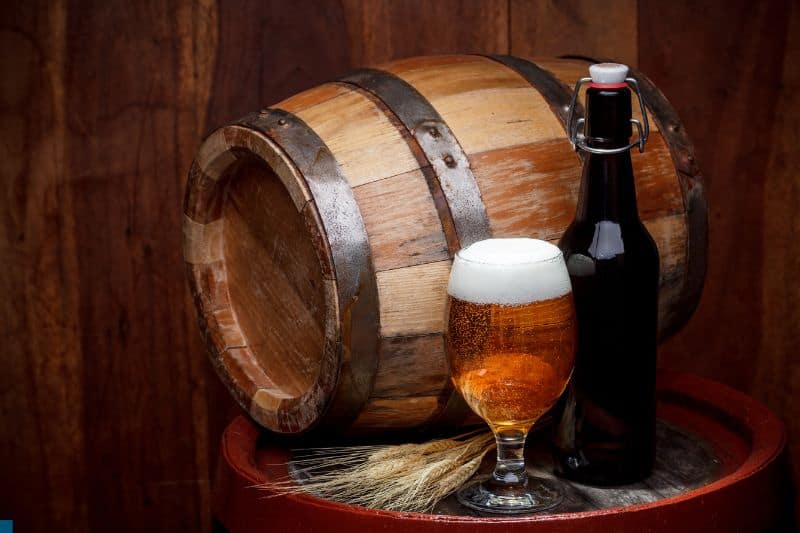When planning a party, having enough beer is essential to keep your guests refreshed and entertained. One popular choice is to buy a keg of beer, but you might be wondering exactly how much a keg weighs. Let’s dive into the topic and explore the keg weights so you know what to expect when purchasing or moving a keg for your event.
The weight of a keg of beer depends on the size and material of the keg and the type of beer inside. Kegs usually come in standard sizes, such as the half-barrel, quarter-barrel, and sixth-barrel.
Generally, a full half-barrel keg weighs around 160 pounds, a smaller quarter-barrel keg weighs around 87 pounds, and the tiny sixth-barrel keg weighs approximately 60 pounds. These weights include both the beer and the keg itself.
It’s essential to consider these weights when planning how to transport and set up the keg at your event. You may need help lifting and moving the keg, especially larger sizes. Also, remember that different types of beer may slightly affect the weight, but now you have a general idea of what to expect when handling a keg of beer.
Read: How Much Does a Pair of Jeans Weigh?
A Pony Keg, also known as a quarter barrel holds 7.75 gallons (29.34 liters) of beer. A Full Keg holds 15.5 gallons (58.67 liters) of beer. An empty Full Keg typically weighs around 30 pounds (13.6 kg) as well, but when filled, it can weigh up to 160 pounds (72.6 kg)
Measuringly.com
Understanding Keg Sizes
When it comes to beer kegs, it’s essential to know the different sizes available so you can choose the best one for your event or establishment. This section focuses on the two most common keg sizes: Pony Keg and Full Keg.
Pony Keg
A Pony Keg, also known as a quarter barrel, is a popular choice for smaller gatherings or when you want to offer a variety of beer choices at your event. You’ll find that a Pony Keg holds 7.75 gallons (29.34 liters) of beer. To give you an idea of how much that is, it translates to:
- Approximately 62 pints (16 ounces each)
- Roughly 82 12-ounce bottles or cans
The weight of a Pony Keg depends on the contents, but an empty one typically weighs around 30 pounds (13.6 kg), and a full one weighs about 87 pounds (39.5 kg).
Full Keg
If you’re hosting a large event or want to stock up on a single beer, a Full Keg (also known as a half barrel) is the go-to option. It’s the standard keg size you’ll find at most bars and restaurants. A Full Keg holds 15.5 gallons (58.67 liters) of beer, which translates to:
- Around 124 pints (16 ounces each)
- Approximately 165 12-ounce bottles or cans
As for the keg’s weight, an empty Full Keg typically weighs around 30 pounds (13.6 kg) as well, but when filled, it can weigh up to 160 pounds (72.6 kg).
Remember, always consider the size of your event, the preferences of your guests, and the available space for storage when choosing between a Pony Keg or Full Keg.

Calculating Keg Weight
When you need to know how much a keg of beer weighs, it helps to break it down into two parts: the empty and filled keg weights. Let’s explore these two components and what factors can influence the overall weight.
Empty Keg Weight
Empty keg weights can vary depending on the keg’s material and the size of the keg. Below are some average weights of empty kegs made from different materials:
- Stainless steel kegs: These tend to be the heaviest, with the average weight ranging from 15 to 30 pounds (7 to 13 kg).
- Aluminum kegs: These are slightly lighter than stainless steel kegs, with an average weight between 10 and 20 pounds (4.5 to 9 kg).
Remember that these numbers can vary depending on the manufacturer and the keg’s size. Keg sizes are commonly referred to as “half barrel,” “quarter barrel,” and “sixth barrel,” with the half-barrel keg being the largest and the sixth barrel keg being the smallest.
Filled Keg Weight
Once you know the weight of the empty keg, you’ll need to add the weight of the beer to get the filled keg weight. The beer weighs about 8.34 pounds (3.78 kg) per gallon. Use the table below to estimate the total weight of a filled keg, depending on its size:
| Keg Size | Beer Volume (Gallons) | Beer Weight (Pounds) | Approximate Total Weight of Filled Keg (Pounds) |
|---|---|---|---|
| Half Barrel | 15.5 | 129.27 | 144.27 – 159.27 |
| Quarter Barrel | 7.75 | 64.63 | 74.63 – 84.63 |
| Sixth Barrel | 5.16 | 43.03 | 53.03 – 63.03 |
Keep in mind that the total weight of a filled keg can vary based on the type of keg you have and the specific beer inside. While this table provides a general estimate, always refer to the manufacturer’s guidelines for the most accurate information on your keg’s weight.
How Much Does a Half Keg of Beer Weigh?
There are a few factors to consider when it comes to the weight of a half keg of beer. First, let’s talk about the size. A half keg, also known as a “pony keg” or “quarter barrel,” can hold 7.75 gallons (29.34 liters) of beer. This is roughly equivalent to 82 twelve-ounce (355ml) servings or 62 sixteen-ounce (473ml) pints.
To determine the total weight, you need to consider both the weight of the beer inside and the weight of the keg itself. Beer typically weighs around 8.34 pounds per gallon (1kg per liter). So for a half keg filled with beer, you’re looking at approximately 64.6 pounds (29.3 kg) just for the liquid.
Next up, you’ve got the keg itself. Most half kegs are made from stainless steel, which is durable and able to withstand the pressure needed for carbonated beverages. The weight of an empty half keg can vary, but on average, it weighs around 15 pounds (6.8 kg).
Putting these numbers together, you can expect a half keg of beer to weigh:
- Beer: 64.6 pounds (29.3 kg)
- Empty Keg: 15 pounds (6.8 kg)
- Total Weight: 79.6 pounds (36.1 kg)
Remember, these numbers are approximate, and factors like the type of beer, packaging materials, and keg design can all cause variations in weight. However, this should give you a good estimate to work with when planning your parties or loading up your kegerator. Enjoy your beer responsibly and have fun!

How Heavy is a 50L Keg of Beer?
A 50-liter beer keg might seem like a lot, but it can be just what you need for a good party. Since you are curious about how heavy a 50L keg of beer is, let’s break it down.
First, let’s talk about the keg’s weight without the beer. The empty keg, typically made of stainless steel, can weigh anywhere from 7.5 kg (16.5 lbs) to 10 kg (22 lbs). This weight may vary slightly depending on the manufacturer and the keg’s overall design.
Now, let’s figure out how heavy the beer itself is. To do so, you need to know the density of beer, which is approximately 1 kg/L. Therefore, 50 liters of beer will have a mass of about 50 kg (110 lbs).
To find the total weight of a full 50L keg, you need to add the weight of the empty keg to the weight of the beer. For example:
- If your empty keg weighs 7.5 kg (16.5 lbs), the full keg will be 57.5 kg (126.5 lbs).
- If your empty keg weighs 10 kg (22 lbs), the full keg will be 60 kg (132 lbs).
So, depending on the keg’s design and material, a full 50L keg of beer can weigh between 57.5 kg (126.5 lbs) and 60 kg (132 lbs). Keep in mind that lifting and transporting a keg of this size can be quite challenging, so it’s a good idea to ask for assistance or use proper equipment like a keg dolly. Happy party planning!
Read: How Much Does a Fire Truck Weigh?
Factors Influencing Keg Weight
It’s important to understand the factors that influence the weight of a keg of beer. In this section, we’ll focus on the type of beer and the keg material.
Type of Beer
The type of beer you choose can make a difference in how much a keg weighs. Different styles of beer have different densities which can affect the overall weight. For example, a heavier stout might weigh more than a lighter lager.
Additionally, the alcohol content can influence the weight of the keg. Beers with higher alcohol by volume (ABV) generally have a higher density, making them heavier.
- Light beers: Typically weigh less than heavier beers
- Stouts and porters: Tend to weigh more due to their density
- Higher ABV: Can lead to a heavier keg because of increased density
Keg Material
Another factor to consider is the material the keg is made from. Kegs are typically made from stainless steel, aluminum, or plastic. Each material has its own set of characteristics that can impact weight:
| Material | Characteristics | Impact on Weight |
|---|---|---|
| Stainless Steel | Durable, reusable, keeps beer fresh | Heaviest option |
| Aluminum | Lighter than steel, easily recyclable | More lightweight than steel |
| Plastic | Inexpensive, lightweight, disposable | Lightest option |
Consider these factors when determining the weight of your beer keg. Choosing the appropriate type of beer and keg material based on your preferences and needs can help ensure you’re getting the most out of your keg.







